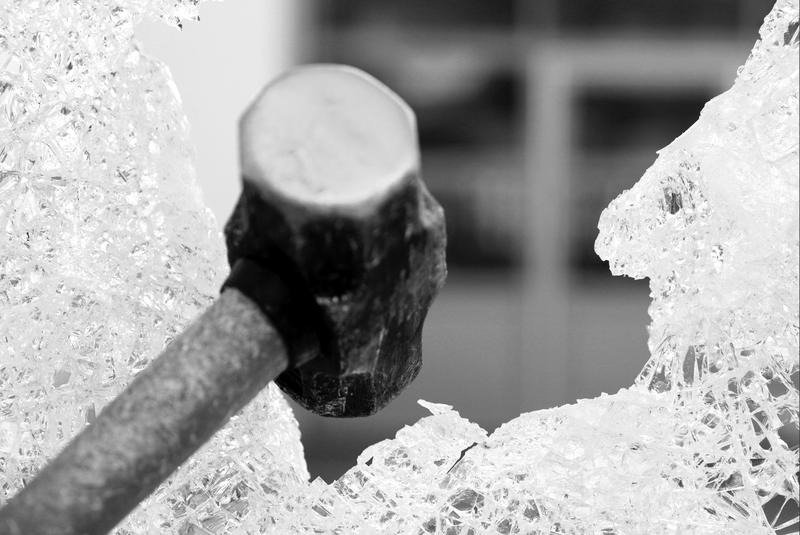
P4A glass is just through throw resisting. But NOT burglary resisting. EN 356 is the basis that divides the through throw resisting glazings into five resistance classes: from P1A glass as the lowest to P5A glass as the highest class. These glass panes can, for example, prevent that a rock is thrown through the glazing. However, if one hits, for example, a P4A glazing several times, then a large hole will open already after about 10 seconds. Traditional P6B glass withstands hits for almost 30 seconds while SILATEC P6B glass offers burglary protection for a total of ten minutes - and this against sledgehammer and ax!
RC2 windows delay unpracticed amateur offenders for approx. three minutes. The window frame offers at least a basic protection against burglars. P4A glass, in contrast, is broken after approx. 15 seconds! This means it is not suitable for RC2 windows. However: Based on the test standard, P4A is used. The glass is not tested but this does not mean that a burglar does not touch it. Optimal burglary protection looks different: Frame and glass should withstand approximately for the same time; for RC2 windows this means about three minutes and this cannot be provided by either P4A or P5A. Traditional P6B glass withstands also only 30 seconds, however, SILATEC P6B glass withstands more than 10 minutes, against sledgehammer or ax.
Among others, P4A glazings are used for staircase railings made of glass. To ensure that persons do not fall even if the pane was damaged. P4A glazings are also used as a roof pane in front of a house door. They need to withstand snow and hail; similar to roof panes in the sunroom. P4A glazings can also be used in gyms: The P4A glazing must withstand here, for example, basket ball throws and must protect the athletes against injuries if the pane should brake. P4A glass is not qualified at all for higher safety requirements.
The “through throw resisting glazing” of P1A, P2A, P3A, P4A and P5A offers no real burglary protection by only providing 15 seconds resistance. The “through throw resisting glazing” of P6B, P7B or P8B glass, also called “armored glass” offer just 30 seconds - after all. SILATEC safety glass P6B, P7B or P8B offers a maximal safety. 10 minutes protection against hammering-in - even against an ax or a sledgehammer!
The glass design of P4A glass is surprisingly simple. Two glass panes, foil in the middle, no more. If the glass pane breaks, then the foil at least keeps the broken bits together and prevents cutting injuries. This is the reason why P4A glass is also called “laminated safety glass” (abbreviated VSG.) However: The P4A glazing is hopelessly overstrained when used for burglary protection.
The thickness of the P4A glazing is normally about 10 mm. For example, these are 2 x 4 mm float glasses and in between 2-3 mm PVB foil. Large P4A glass panes are thicker for static reasons and they consist, for example, of 2 x 8 mm float glass with a foil in between.
For insulating glass, another glass pane is placed in front at a distance of often 8-16 mm. This heat insulating intermediate space will be filled with an inert gas to further reduce the heat losses. This double glazing can be layered to a triple P4A glazing, the design is similar.
P4A glass is available with a glass thickness starting at approx. 10 mm. The glass thickness is a minimum of about 24 mm for a double glazing with improved heat insulation. The glass thickness for triple insulating glass starts with approx. 38 mm. For static reasons, the listed glass thickness increases with an increasing pane size.
When dismantled, the expert can identify the glass design by analyzing the edge and identify in this manner whether it is a P4A glass. If the glass edge is not visible, which means in an installed condition, then you can first look for markings or identifications on the glass pane. The identifier for insulating glass panes may be printed in the intermediate space of the pane, which means on the so-called spacer between the glass panes. The experienced expert can use a laser measuring device and can make the glass design “visible” even in an installed condition and can identify in this manner whether this is a P4A glass. However, this process does not guarantee a 100% certainty, because only the thickness of the intermediate layer can be measured, however, the material cannot be identified. A typical P4A glazing finally consists of two glass plates with a thickness of 4 to 6 mm, in between is a foil with a thickness of approx. 2-3 mm.
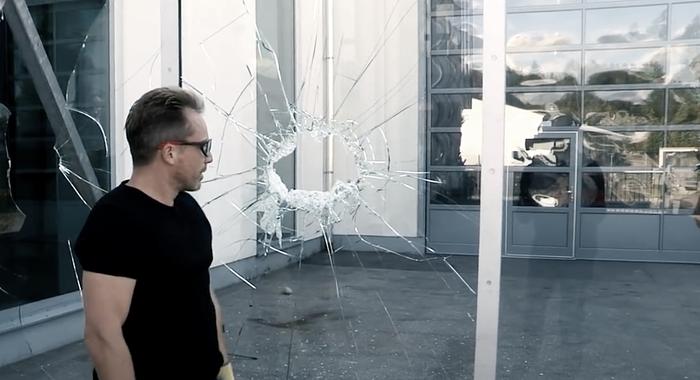
No. The P4A glazing does not offer any burglary protection. Because the glass can be broken with a heavy hammer in only about 15 seconds.
P4A glass will be tested with a steel ball. A ball weighing 4.1 kg with a diameter of 10 cm will be dropped from a height of 9 m onto the P4A glazing. Three times. Not on the same point, but at a distance of 13 cm from each other. During this test, the ball must not fall through the P3A glazing. However, it can fall through after five seconds; in this case the standard is still fulfilled. In practical use, one can only hope that it does not drop on anyones head!
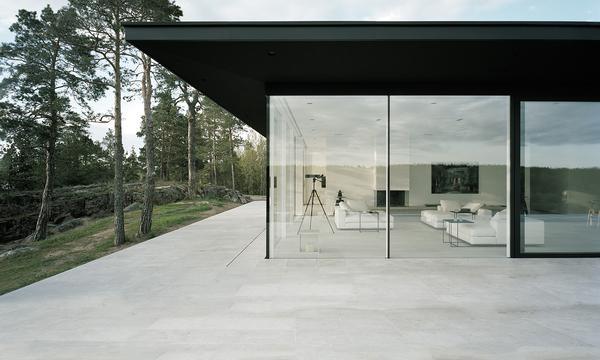
This is where you will get all the information about P6B glass
P6B glass
This is where you will get all the information about P7B glass
P7B glass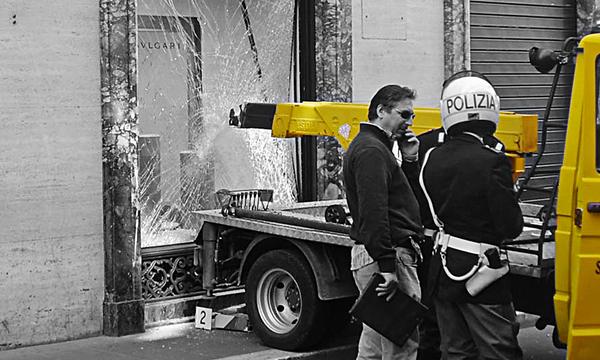
This is where you will get all the information about P8B glass
P8B glass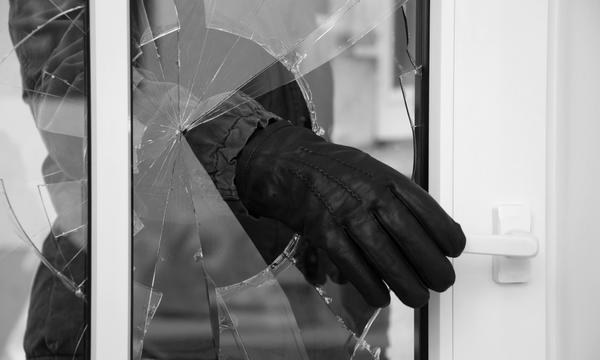
This is where you will get all the information about P2A glass
P2A glass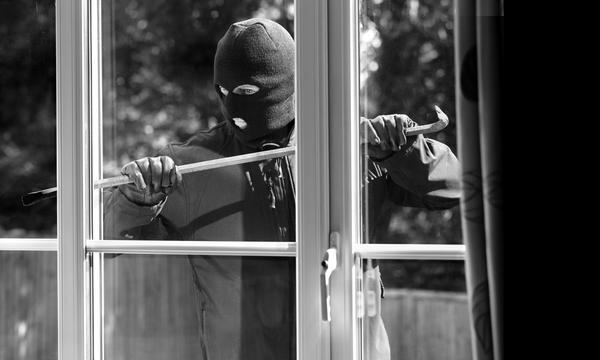
This is where you will get all the information about P4A glass
P4A glass
This is where you will get all the information about P5A glass
P5A glassActually yes - however, what good does the safe frame do if the P4A glass is broken and collapses already after about 15 seconds? However, why is the P4A glazing recommended for RC2 windows? Because the glass is not tested by the test standard! Why? We really do not know. RC2 windows delay a burglar for approx. three minutes. Normal P6B glass only for 30 seconds, however, SILATEC P6B for about 10 minutes. This is what we call burglarproof.
No. Because in contrast to RC2 doors, the glass for RC2 panic doors is tested during the burglary test. And P4A glass does not qualify at all. Therefore, only tested “panic glass for panic doors” may be installed in RC2 escape doors. e.g. SILATEC RC2 panic glass starting with a thickness of 16 mm.
Yes. Despite the fact that it only fulfills very few safety requirements. Described with precision, it is designated “laminated safety glass” - abbreviated “VSG”. If this VSG glass breaks, then the broken glass pieces stick to the foil between the glass panes to prevent cutting injuries. However, if normal float glass breaks, then sharp glass splinters with a high injury potential are generated.
The prices of P4A glass are approx. 100 to 350 EUR/m2 - depending on the size of the glass pane. Monolithic (i.e. single) P4A glass costs start at approx. 100 EUR/m2. Insulating glass and triple insulating glass costs start at approx. 200 to 350 EUR/m2; plus tax, transport and installation. Large glass panes are more expensive than commercially available format with approx. 1-4 m2 and they reach prices around 800 EUR per m2 for XXL formats.
Definitely not for burglary protection. Because P4A glass can be broken already in approx. 15 seconds - easily! However, it can be meaningful as overhead glazing, for example, in the sunroom or as an awning above the house entrance. In this application, the P4A glazing protects, for example, against hail or falling glass splinters.